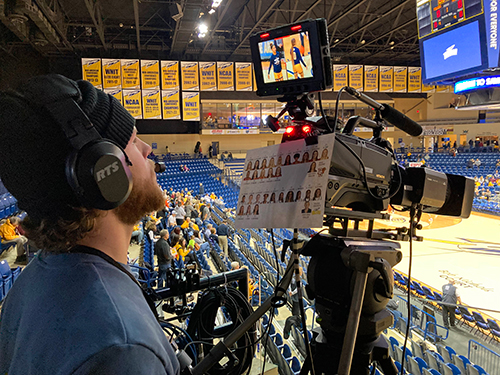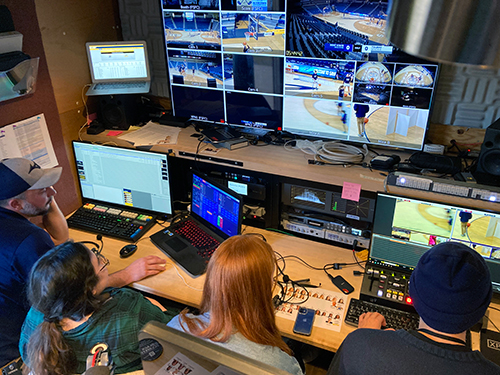As The University of Toledo basketball season gets underway, expect all eyes to be on the new center-hung video board during home games in Savage Arena.
Rockets are of course featured on those four screens above center court, shooting and rebounding and defending their opponents. But students also play a starring role behind them, producing the professional-quality live broadcasts that follow the action on the court.

Student Nick Schroeder operates the slash camera for a women’s basketball game during the 2022-23 season. UToledo students first produced a professional-quality live broadcast for ESPN nearly a decade ago. This semester, the experiential learning program reached a milestone: 500 broadcasts to date.
“We’re excited about the new video board,” said John Eidemiller, who as executive producer works closely with these students on video board content at football and basketball games, as well as the live broadcasts of basketball, baseball, softball, volleyball, soccer and other sports that stream on ESPN+. “Everyone in the arena can see what our students are doing in ultra-high resolution.”
UToledo has been putting students behind the camera since 2015, when an agreement between the Mid-American Conference and ESPN presented an exciting opportunity for exposure for the University and experiential learning opportunities for its students.
UToledo’s Department of Communication and Media coordinated with Toledo Athletics to launch a production operation run largely by students enrolled in a hands-on course, now titled Live Sports Production, that’s designed to train them as camera operators, audio technicians, graphics operators, video replay operators and production assistants in the course of live broadcasts for ESPN.
Sound daunting? It can be, said Emma Moon, a communication sophomore who acknowledges she didn’t know much about sports when she signed up for Live Sports Production.
“It was a bit nerve-wracking at first, because we’re college kids with little to no experience working with cameras and we’re putting on a full broadcast for live television,” Moon said, thinking back to her first broadcasts alongside Eidemiller and Greg Smith, who are the professional staff who assist with productions and manage student staff.
But it’s a learning environment, she said. It’s all right to learn from mistakes.
“John and Greg reassured me and made me feel much better about the mistakes I made in my first broadcast,” Moon said. “They’re the perfect people to run these broadcasts. It’s clear that they love what they do and just want you to succeed, which also makes doing these broadcasts that much more enjoyable.”
Eidemiller and Smith typically work with a team of 20 to 25 students, who sign up to broadcast games as their schedules allow. The team also runs in-house video board production in Glass Bowl Stadium and streams special events on campus.
A little more than half of the students on the team are typically enrolled in Live Sports Production, which serves as an on-ramp to the more advanced responsibilities available to students who want to continue their involvement through independent study or paid employment.
Senior Isaac Machon, for example, has been manning a camera on the sidelines of games or a running graphics or replay in the mobile production truck since he took the course as a sophomore.
Now employed and trained as a replay operator, Machon’s responsible for identifying standout moments in a game — and the cameras that best captured them — to replay during the broadcasts.
“I was looking for a hands-on experience, and that’s exactly what it gave me,” he said.

Greg Smith, left, technical director, shows student Cathryn Duran how to operate the Ross XPression graphics system, while fellow student Grace Powell (third from left) teaches her classmate Trip Floyd how to run replay for basketball broadcasts.
Nearly 10 years after the production operation’s inaugural broadcast in 2015, and nearing the end of a semester that saw the celebration of a milestone 500 broadcasts to date, the operation has advanced significantly in scope and sophistication.
“We’ve gotten more elaborate in our coverage,” Eidemiller said. “When we first started, we were only using four cameras in a production. Now we have a minimum of five cameras for every production that we do and 10 to 12 for basketball.
“We’ve added more advanced replay and graphics systems as well,” he continued. “And we’ve expanded the number of sports that we’ve covered. We would have never been able to do golf when we started. We’ve been doing that for the past five years.”
It all makes for a distinctive offering at UToledo, which he sees as standing apart from other universities in its degree of student integration and its professional-level production value.
The benefits extend beyond students interested in sports or sports media.
“The students are learning specific broadcast skills, but they’re also learning how to work as a team and how to work in a fast-paced environment,” Eidemiller said. “Regardless of whether they’re interested in working in sports media or video production, they’re going to come away with valuable skills that will translate into any number of career fields.”
Grace Powell, who graduated with a bachelor’s degree in communication in May, 2023, can attest to the value of this on-the-job learning experience.
She’s now working as a media replay operator for ESPN — the same role she learned in her final semesters with the production operation at UToledo.
“During my year as a replay operator I learned something new with every show,” she said. “It was completely new and pretty difficult for me, but the whole point was learning and getting better. I made plenty of mistakes but it always felt good leaving knowing I was better than when I showed up.
“Broadcast experience is really the only way to learn in this field and the amount that I was able to get in two years through this program was so valuable.”